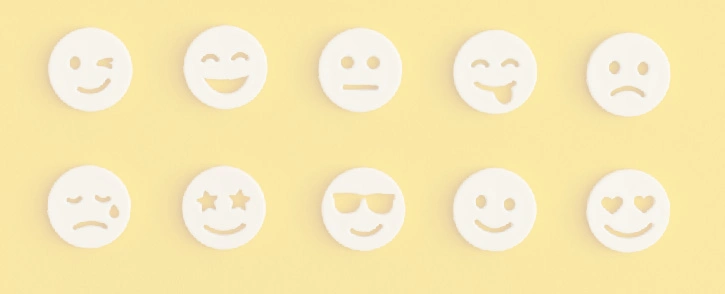
Social Media Addiction Lawsuit Overview
Millions of people in the United States and across the world use social media. New research shows that a significant number of these users, including children, are addicted to the platforms. Social media addiction has led to serious mental health issues such as eating disorders, depression, suicidal behaviors, and self-harm.
Studies indicate that children and adolescents, particularly teens and young adults, are more susceptible to the harmful effects of social media addiction. A wave of lawsuits against social media platforms like Facebook, Instagram, TikTok, and Snapchat allege that the companies behind them knowingly designed their algorithms to addict young users, putting them at risk and prioritizing profit over user safety.
It is further alleged that despite knowing of these issues, the companies have worked to increase the addictiveness of their platforms without adequately warning consumers of the risk of harm. Individuals who have suffered from social media addiction are strongly encouraged to contact King Law to schedule a free consultation to determine whether they can take legal action against the companies that caused them harm.
Social Media Lawsuit – 2025 Updates
October 17, 2024: Judge Rules That Social Media Addiction Lawsuits Against Meta Can Proceed
October 7, 2024: Arkansas Woman Files Lawsuit Against Social Media Companies
September 1, 2024: Court Grants Access to Plaintiff’s Mobile Data in Social Media Addiction Lawsuit
The court has granted access to data from the plaintiff’s mobile devices in the Social Media addiction lawsuit. This decision is logical, given that the lawsuit alleges that the use of social media platforms, primarily through mobile devices, has caused injuries to the plaintiff. As a result, the device and its content are considered evidence that the defense is arguably entitled to review. The plaintiffs have sometimes argued that the defendants already possess this data, as the social media platforms like Facebook, Instagram, TikTok, and Snapchat are where the data was generated. However, the parties have struggled to efficiently agree on how the data from the plaintiff’s cell phones will be exchanged.
August 1, 2024: Ongoing Social Media Addiction Litigation Sees Delays in Data Production
Plaintiffs must have forensic imaging done on their electronic devices to produce information, including app usage data, browser history, search data, communication logs, deleted data, media files, device usage data, health and fitness data, and notification data. As of July 27, the plaintiffs have yet to provide this information to the court but instead asked for specific parameters to ensure the forensic imaging will only pull meaningful data. At least four plaintiffs have used school devices to access social media platforms, and the defendants have issued an order for each school district to seize the electronics, yet the plaintiffs have objected to this. It seems there is constant back and forth between the defendants and plaintiffs in this case, causing the two-year-old litigation to move forward slowly yet effectively. If you or your child is under the age of 24 and has suffered from social media addiction that eventually led to counseling, crisis intervention, or psychiatric services, please contact us to see what you may be eligible for.
July 18, 2024: Document Discovery Continues in Social Media Addiction Lawsuit
Litigation for the social media addiction lawsuit is currently deep in the discovery phase. The Discovery phase involves the exchange of evidence, including documents, emails, and other communications, between the plaintiffs and defendants to ensure a level playing field at trial. Defendants typically resist the breadth of discovery requests. To date, Meta, has provided 270,591 documents, totaling over 1.5 million pages. The upcoming Document Discovery Conference, scheduled for August 15, 2024, will bring the parties together before the judge to discuss the case details, such as witness statements, the documents in question, and any thoughts on potential settlement options.
June 18, 2024: New York Passes SAFE for Kids Act to Regulate Social Media Feeds for Minors
The New York Legislature recently passed a bill known as the “Stop Addictive Feeds Exploitation (SAFE) for Kids Act.” The legislation underscores the concerns about the harm social media feeds, like Facebook and Instagram, can have on minors. The bill aims to prohibit social media companies from providing minors with addictive feeds without parental permission. Addictive feeds are defined as media which is designed to keep users engaged based on the data collected and machine learning about a user’s activity. The proposed law requires social media companies to check and verify a user’s age and obtain parental consent when necessary. The bill also prevents social media feeds from promoting content or sending notifications about addictive social media feeds at night. The bill has passed both the Senate and the Assembly and will be delivered to Governor Hochul for her signature.
May 22, 2024: Motion to Dismiss Filed Against Mark Zuckerberg in Social Media Addiction Lawsuit
Lawyers have filed a motion to dismiss the lawsuits brought against Meta founder Mark Zuckerberg in his personal capacity. The defendants rely on two legal arguments to assert that Zuckerberg is not personally liable to children who have become addicted and harmed by social media. First, the defense says that the law requires that the Facebook founder took affirmative action or directed conduct that was a violation of civil law. Second, the defense argues that the allegations brought by the plaintiffs only allege that Zuckerberg failed to act, which is not enough for personal liability. The motion to dismiss the social media addiction lawsuit was filed on May 10, 2024, in the Northern District of California.
May 14, 2024: Study Highlights Medical Concerns in Social Media Addiction Lawsuit
An important study by Alfonso Pellegrino, available in the National Library of Medicine, highlights several important medical issues at play in the social media addiction lawsuit. The study reviews global research from 2013 to 2022, focusing on Facebook and Instagram and identifying various risks associated with habitual use. The study indicates a need for social media regulation, education, and parent involvement. The social media addiction lawsuit alleges that platforms are designed to keep children engaged as long as possible and that they can lead to harm, including depression, self-harm, and eating disorders, among other injuries.
May 12, 2024: New York City Joins Social Media Addiction Lawsuit with Detailed Complaint
New York City has joined the Social Media Addiction Lawsuit. Corporation Counsel Sylvia O. Hinds-Radix filed a 305-page complaint into the federal lawsuit located in the Northern District of California. The complaint is similar to previous complaints in that it alleges that social media giants Facebook, Meta, Snap, and TikTok have designed products to prey on the developing brains of children. The complaint goes into great detail about the mental health crisis faced by teens in New York City. This complaint seems to set the stage for more municipalities to participate in the Social Media Addiction Lawsuit. The cities are saying that the products designed by social media companies are leading to huge expenses for mental health costs for the cities, and the lawsuits seek to recover those costs.
May 8, 2024: Intense Legal Battle Continues in Social Media Addiction Lawsuit
May 7, 2024: Selection of Plaintiffs for Bellwether Trials in Social Media Lawsuit Approaching
May 6, 2024: Social Media Addiction Lawsuit Progresses Amid Discovery Disputes
April 28, 2024: Social Media Addiction Lawsuit Progresses as Motion to Dismiss Is Denied
April 20, 2024: Family Files Lawsuit Against TikTok’s “For You” Algorithm Over Tragic Loss
The family of a 16-year-old boy who took his own life has filed a lawsuit alleging that the “For You” algorithm on TikTok suggested videos that promoted suicide and self-harm. The family joins eight others who have lost children in similar ways. The lawsuits allege that the platforms are “dangerous and defective because they are addictive for young people.”
March 2024: Connecticut Teen Files Lawsuit Citing Social Media as Cause of Eating Disorder
A Connecticut teen who alleges she suffered an eating disorder as a result of social media files a lawsuit, joining the now almost 400 cases against the companies.
February 2024: Widespread Legal Action Against Social Media Companies as Trials Approach
In addition to the hundreds of lawsuits and now 42 states and the District of Columbia, that have filed lawsuits against social media companies like Meta, over 140 school districts have joined the fight. Trials are expected to begin for the MDL in 2025.
January 2024: Mark Zuckerberg Apologizes at Judiciary Committee Hearing on Child Safety
Mark Zuckerberg apologizes to families with children who have been abused through his platform in a contentious Judiciary Committee hearing on child safety.
November 2023: Federal Judge Allows Social Media Addiction Lawsuits to Proceed
A federal judge rejected an argument by social media companies that they were immune from being sued. The decision allows the hundreds of social media addiction lawsuits filed on behalf of children and teens to move forward.
October 2023: 41 States and D.C. File Lawsuit Against Meta Over Youth Engagement Practices
41 states and the District of Columbia filed a lawsuit against Meta, the parent company of Facebook, Instagram, Whatsapp, and Messenger, alleging that the platforms were designed to entice youth and teens to use them compulsively.
October 2022: Adolescent Social Media Addiction Lawsuits Consolidated into MDL in California
Lawsuits alleging that social media platforms are designed to maximize screen time and encourage addictive behavior in adolescents are consolidated into multidistrict litigation (MDL) in the Northern District of California (In re: Social Media Adolescent Addiction/Personal Injury Products Liability Litigation (MDL No. 3047).
On this page:
What Is Social Media Addiction?
Social Media Addiction in Teens
Causes of Social Media Addiction
Effects of Social Media Addiction: Signs, Symptoms, and Side Effects
The Most Addictive Social Media Platforms
The Defendants in the Social Media Lawsuits
Who Qualifies to File a Social Media Lawsuit?
How to File a Social Media Addiction Lawsuit
Statute of Limitations for a Social Media Addiction Lawsuit
Social Media Lawsuit Settlement and Payout Amounts
What Is Social Media Addiction?
Social media addiction is defined as a type of behavioral addiction that is characterized by the compulsive use of social media platforms that disrupts key life areas, including interpersonal relationships, performance at work or school, and physical health.
According to research, an estimated 5 to 10% of Americans may meet the criteria for a social media addiction. While not yet a diagnosable condition, measures used for the condition are based on similar behavioral addictions such as gambling disorder.
Social media is believed to create a dopamine-inducing environment similar to those triggered by gambling and drugs, causing addiction. Studies, such as one published in the International Journal of Clinical and Experimental Medicine, have surmised that dopamine plays a key role in internet addiction disorder. Signs of social media addiction may include if social media dominates your thoughts and daily life, it has had a negative impact on your performance at work or school, you experience withdrawal or distress when you do not have access to it, and you are unable to stop or limit your use.
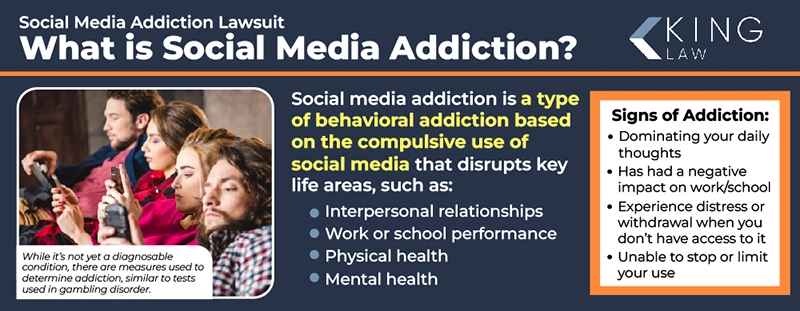
How Social Media Is Addictive
As explained by Jefferson Health, studies have shown that social media can trigger the release of dopamine, stimulating the brain’s reward centers. Activities on social media, such as receiving likes or comments, drive dopamine surges, resulting in the desire to continue using the platform.
Lawsuits filed against social media platforms allege that the companies knew of the addictive qualities of their products and failed to adequately warn consumers about the dangers. It is believed that the manifestation of social media addiction is both psychological and physical. It can alter brain chemistry and patterns of behavior.
Social media platforms provide immediate, rewarding feedback for minimal effort, which then encourages continuous engagement. Because social media is frequently centered around talking about oneself, the reward centers are even more active, continuing to drive the use of the platform to achieve a positive experience.
Addicting Social Media Design Features
Social media platforms such as Facebook, Instagram, TikTok, and Snapchat often employ design features that feed their addictive qualities, including endless scrolling, personalized content recommendations and reels, instant feedback (likes and comments), push notifications, read-receipts, auto-play, and ephemeral content. It is argued that these features exploit a person’s vulnerabilities and desires, encouraging prolonged usage.
Addictive features employed by social media platforms:
- Infinite Scroll/Autoplay: Users can endlessly scroll or view auto-playing videos. These features keep adding content without a cut-off point, making it hard to stop interacting. For teens, in particular, this may play into their impulsivity, making it even more challenging to stop use of the platform.
- Personalization Algorithms: The content is tailored based on an individual user’s interactions and preferences, creating a feedback loop that presents continuously engaging material.
- Ephemeral Content: Features like content that disappears after 24 hours (e.g., Snapchat Stories) induce FOMO (fear of missing out), prompting urgent consumption.
- Reels: Platforms use algorithms to deliver a nonstop stream of short-form videos lasting 15 to 90 seconds, which capture and retain attention, especially effective for shorter attention spans.
- Push notifications: Notifications act as triggers that prompt an immediate user response, which is then reinforced by social rewards like likes and comments.
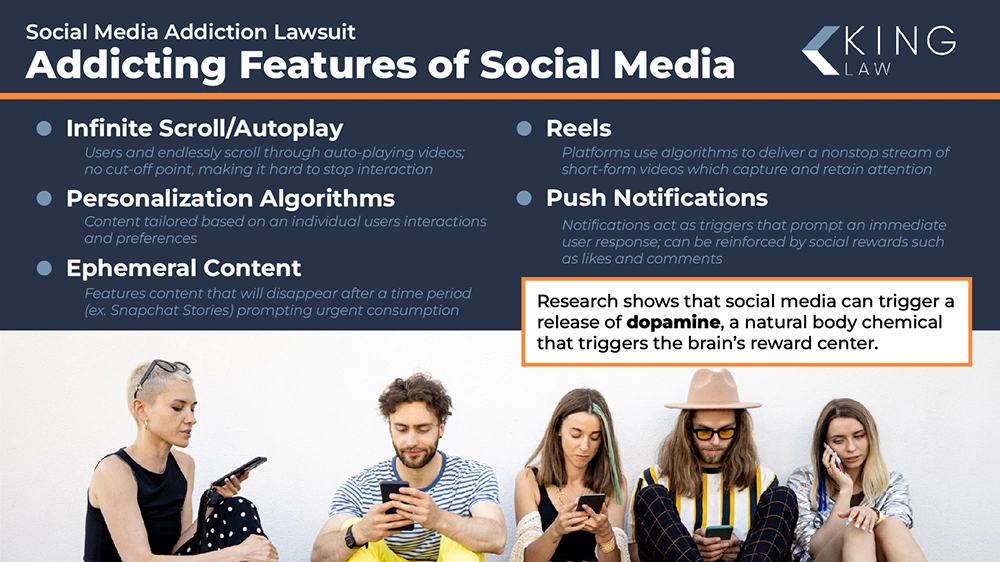
Social Media Addiction in Teens
Recently filed lawsuits allege that excessive social media use by teens may put them at an increased risk for severe mental health issues, including depression and ADHD. Studies show that addiction may lead to reduced life satisfaction and may exacerbate underlying conditions common in adolescents.
Social media addiction in teens may lead to:
- Increased depression and reduced life satisfaction.
- The exacerbation of conditions like ADHD, anxiety, oppositional defiant disorder, and depression.
- The nervous system being pushed into fight-or-flight mode.
- The triggering of dopamine-driven highs.
- An inability to reduce usage
- Lying about social media usage.
- Persistent thoughts about social media when not online.
- Symptoms of withdrawal.
- A delay in the development of healthy social skills.
- The preference for virtual interactions over real-life connections and relationships.
- The inability or delayed ability to develop their true identity.
It is crucial for parents to monitor for signs of excessive social media use and potential mental health issues, being aware of how much time their children spend online and their overall behavior concerning social media.
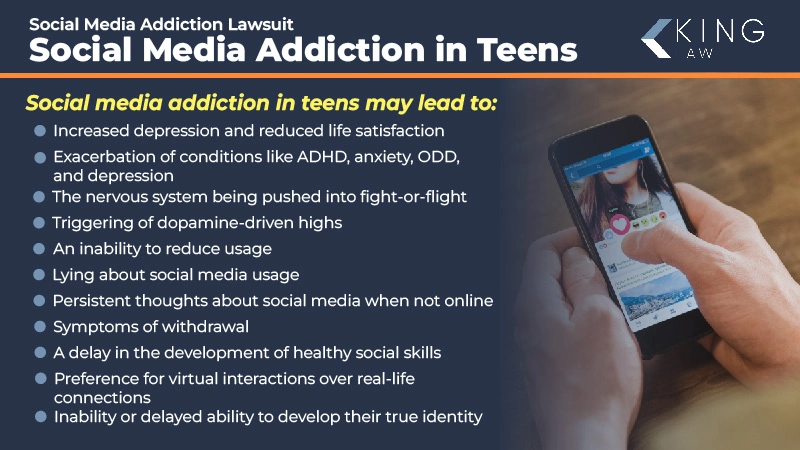
Statistics of Social Media Addiction
Social media use is prevalent among people of all ages. It is estimated that up to 10% of Americans are addicted to social media, meaning that approximately 33 million people suffer from the condition.
Pew Research Center Statistics on teen social media usage:
- 95% of teens between the ages of 13 and 17 use YouTube.
- Nearly 1 in 5 teens say that they use YouTube “almost constantly.”
- 67% of teens between the ages of 13 and 17 use TikTok.
- Over half (54%) of teens said it would be hard to give up social media.
- 62% of teens between the ages of 13 and 17 use Instagram.
- One 1/3 of teens believe that they use social media too much.
- 59% of teens between the ages of 13 and 17 use Snapchat.
- The number of teens who report using Facebook has declined significantly since 2015, from 71% to 32%.
- 97% of teens use the internet on a daily basis.
- 95% of teens have access to a smartphone, up from 73% in 2014/2015.
While specific recovery statistics are lacking, behavioral therapy, including Cognitive Behavioral Therapy (CBT), Dialectical Behavioral Therapy (DBT), Motivational Interviewing (MI), and Group Therapy, has been identified as the most effective treatment for social media addiction.
Causes of Social Media Addiction
Most researchers believe that social media addiction is caused by the release of dopamine when certain activities occur on the platform. For instance, a like or comment may trigger the brain’s reward system, which then strengthens the desire to repeat the activity.
It is well-documented that social media platforms use design elements and algorithms that increase user engagement for greater advertising revenue. Additionally, social media utilizes the Fogg Behavioral Model is utilized by these platforms, which incorporates motivation (such as FOMO), action (interaction with content), and triggers (notifications).
Teens that may be at a higher risk for social media addiction:
- Females.
- Teens with low self-esteem, depression, impulsivity, poor body image, or other mental health issues.
- Adolescents with certain personality traits, such as extraversion or introversion.
- Individuals who struggle with impulsivity.
- Teens with a desire for social influence or who are looking to reaffirm their identity.
Part of the addictive cycle and consequences of social media is that it may be used to relieve negative emotions. Unfortunately, social media can also lead to increased feelings of FOMO and inadequacy while causing further mood deterioration. A teen’s reliance on social media to relieve these feelings may drive more use, exacerbating these emotions.
Effects of Social Media Addiction: Signs, Symptoms, and Side Effects
The effects of social media addiction can be devastating, particularly to children and adolescents. Documented health concerns related to excessive use include feelings of isolation, anxiety disorders, eating disorders, disrupted sleep, poor academic performance, and suicide.
Signs of social media addiction:
- Excessive time spent on social platforms, often at the expense of personal relationships and responsibilities at work or school.
- Changes in mood or behavior, such as skipping social events, neglecting hobbies, and reduced physical activity. This may also be evidenced through secretive behavior, such as creating fake accounts or hiding social media use.
- A noticeable decline in academic or work performance due to the distraction of social media.
- Identifiable anxiety or emotional withdrawal when the phone or social media is inaccessible.
- Compulsive checking of social media accounts.
Social media addiction can also have severe mental health effects, including an increased risk of anxiety, depression, eating disorders, body dysmorphia, and self-harm among teenagers. It may also lead to dangerous behaviors, such as participation in harmful challenges, insomnia, and the potential for sexual exploitation.
An overreliance on social media may cause teens and adolescents to struggle to form or maintain real-life relationships. This reliance on social media may also lead to cyberbullying and constant social comparisons that can exacerbate mental health issues. These mental health issues may become severe, leading to an eating disorder or suicidal thoughts.
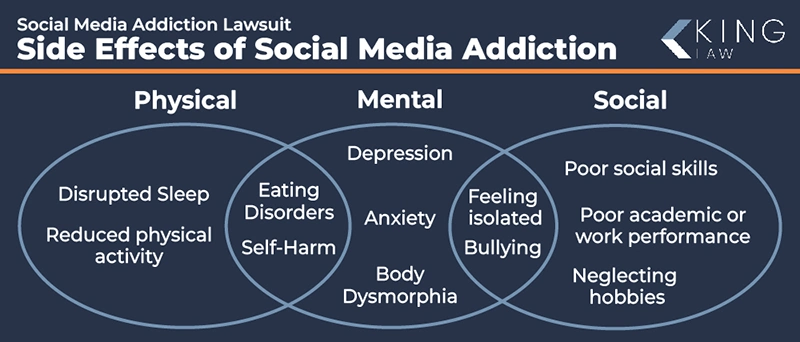
The Most Addictive Social Media Platforms
While users often cite TikTok, YouTube, and Facebook as the most addictive apps, almost all social media platforms may cause psychological or physical harm, particularly to children and adolescents.
According to the Pew Research Center, the daily usage statistics of social media in the U.S. are:
- Facebook: 70% of adults in the U.S. use it daily. The platform is used more frequently by women (77%) compared to men (61%). The largest user base for Facebook is between the ages of 18 to 64 years old.
- Snapchat: 59% of adults in the U.S. use it daily. The platform is used slightly more by females with the majority of its user base between the ages of 18 and 29 years old.
- Instagram: 59% of adults in the U.S. use it daily. The platform is used by women more than men and by individuals between the ages of 18 to 29 years old.
- Twitter: 46% of adults in the U.S. use it daily. While the user base is generally between 18 to 29 years old, it is split evenly by gender.
- YouTube: 54% of adults in the U.S. use it daily. Over 80% of the U.S. uses the platform with the main user base between the ages of 18 to 49 years old.
Other platforms, such as Pinterest, Reddit, and LinkedIn, are frequently used by adults but not as prevalent among adolescents. TikTok, on the other hand, is used by 21% of people, with the largest user group between the ages of 18 to 29 years old.
The Defendants in the Social Media Lawsuits
The defendants in social media addiction lawsuits are almost exclusively social media companies or parent companies of the platforms themselves.
Defendants in social media addiction lawsuit cases may include:
- Meta Platforms: The parent company of Facebook and Instagram. 70% or more of cases have been filed against this company.
- ByteDance: The parent company of TikTok.
- Snap Inc.: The parent company of Snapchat.
- Alphabet Inc.: The parent company of Google and YouTube.
Last year, over 80 cases against social media companies were consolidated into a multidistrict litigation. The notable majority of these cases targeted Meta’s Facebook and Instagram for adolescent addiction issues.
Who Qualifies to File a Social Media Lawsuit?
To file a lawsuit based on social media addiction, you must meet certain eligibility requirements. These criteria include that you used social media extensively, proof that the addiction began prior to you turning 21, and that you suffered actual harm from the addiction.
Eligibility criteria for a social media addiction lawsuit may include:
- Use of social media for three or more hours daily
- Proof of extensive social media use prior to turning 24
- Diagnosed psychological or physical conditions, including depression, anxiety, self-harm, eating disorder, suicidal behaviors, or loss of life
- Proof of treatment for injuries related to social media use
Conditions that may qualify for a lawsuit include mental health disorders, proof of excessive (beyond normal) social media use, and a diagnosable injury. Injuries that have been documented in similar lawsuits include anorexia nervosa, bulimia nervosa, binge-eating disorder, depressive disorder, anxiety disorders, suicide, and self-harm.
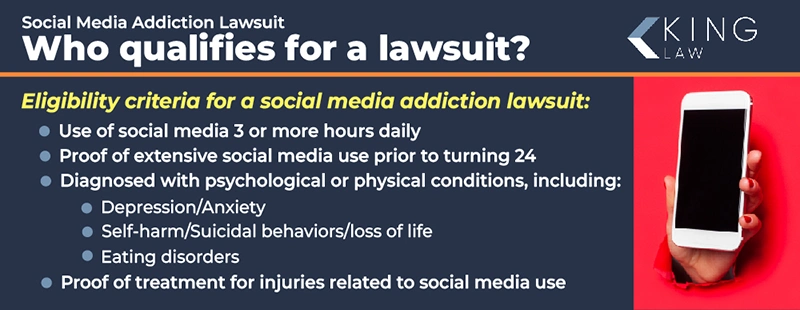
Evidence to Collect to File the Lawsuit
Social media addiction lawsuits generally require substantial evidence to help prove the claim. An attorney can help determine the evidence that may be necessary in your case.
Evidence that may help substantiate your claim:
- Documentation of extensive daily social media use
- Phone logs
- Proof of engagement on social media
- Medical records showing psychological or physical harm caused by social media use
- Proof of treatment for a condition related to social media addiction
How to File a Social Media Addiction Lawsuit
There are several steps that you should take to file a social media addiction lawsuit. The most important one is working with an experienced attorney who can help verify your eligibility, collect necessary evidence, and file your lawsuit.
Steps to take to file a social media addiction lawsuit:
- Verify eligibility. You must meet certain criteria to file a social media addiction lawsuit. An attorney can help ensure you meet these qualifications.
- Collect evidence. You will need to gather all relevant evidence that may help to substantiate your claim, including documentation of social media usage, medical records detailing psychological or physical harm, and proof of treatment for your injuries.
- File the lawsuit. Once you have fully prepared the case with the help of your attorney, you will file the lawsuit. It is important to ensure that it is filed within the legally specified deadlines to ensure your case is heard.
- Begin negotiations. Once the lawsuit has been filed, your attorney may engage in negotiations with the defendants to reach a settlement agreement before the trial, if possible.
- Prepare for trial. If a fair settlement cannot be reached, the matter will be set for trial.
Statute of Limitations for a Social Media Addiction Lawsuit
The statute of limitations in a social media addiction lawsuit is state- and case-specific. The amount of time you have to file a case may differ significantly depending on the individual circumstances of the case. Prior to filing, it is imperative to have a firm understanding of local state laws and legal timelines that may affect your case. Working with an attorney can help ensure your case is filed in a timely manner to maintain eligibility for legal action.
Social Media Lawsuit Settlement and Payout Amounts
Potential payouts and settlements in a social media addiction lawsuit may differ substantially depending on the specifics of the case. Many cases are in the early stages of litigation, so it is difficult to determine the potential value of individual cases. However, cases involving teen suicide may result in settlements or payouts ranging from $1.5 to $5 million, depending on the circumstances.
Injuries in social media addiction claims are expected to range in severity and may include eating disorders, depression, anxiety, self-harm, suicidal thoughts, and child sex abuse. Cases involving less severe injuries, such as self-mutilation or a diagnosed eating disorder, may have lower settlement values, with most expected to range from $10,000 to over $100,000 depending on the individual facts of the case and broader litigation trends.
Currently, there have been no settlements reached in social media addiction lawsuits. Projections for these cases are based on the impacts on mental health and the potential for serious outcomes such as suicide. They are also based on the comparison with other mass tort settlements.
Contact a Social Media Addiction Lawyer
If you have been diagnosed with social media addiction or have suffered adverse health effects from social media, contact our office to speak with an experienced attorney. At King Law, our attorneys have decades of collective experience handling mass tort and defective product cases. Our legal team will work tirelessly and strategically to get the compensation victims deserve. All consultations are free and without obligation to retain our services.
Frequently Asked Questions (FAQs)
Get answers to any major questions you have regarding the social media addiction lawsuits.

